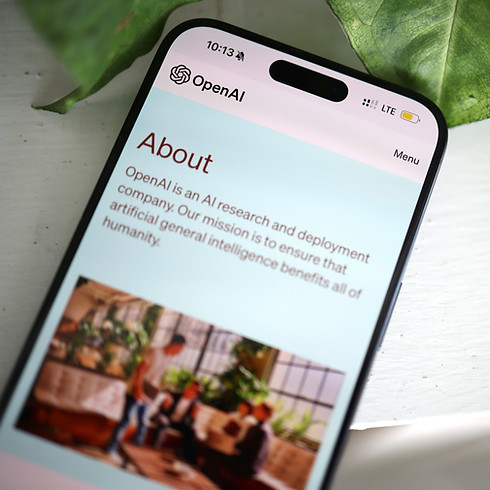Optimism about the future is only warranted when we can objectively look at the past and choose differently for the future. Meeting this moment will require great thought, new ideas, and a shift in perspective and accountability.
BOOKING INQUIRIES: 314-698-3948
hello@nextgenethics.com

LESSON 1: AI ETHICS FOR EVERYONE
Before you can begin to understand how to use AI, you must understand the challenges its use brings.
WHY AI ETHICS
An ethical edge in AI and technology refers to an advantage and skill
Understanding AI ethics isn't just for tech experts; it's crucial for everyday users navigating a world increasingly shaped by artificial intelligence. Learning about AI ethics empowers individuals to make informed decisions about the technology they interact with daily.
It provides a lens to comprehend the ethical considerations behind algorithms that influence our choices, privacy implications in data usage, and the societal impact of AI-driven decisions. By grasping these principles, everyday users can actively engage in conversations, demand accountability, and contribute to shaping a more ethically conscious AI landscape that aligns with their values and interests.
The Power of Open-Minded Discussion
Ethical dilemmas often present multifaceted perspectives, each carrying its own reasons and rationale. Approaching these debates with an open mind fosters a deeper understanding of diverse viewpoints, unveiling nuances that enrich our ethical considerations.
Embracing differing opinions doesn't just broaden our outlook; it cultivates a more inclusive and robust ethical discourse, leading to comprehensive solutions that resonate across varied perspectives.
GENERATIVE AI
Inflection Point: ChatGPT
Artificial intelligence is the simulation of human thinking by machines. In fact, if you have used a chat bot to ask and answer a question, responded to an online recommendation from a website, been suggested to "like" a person or product then you have already experienced and interacted with AI.
So, what's special about ChatGPT? For the first time a person who is not a programmer can speak to technology and it can reply with more than a standard formulaic answer. It can even recognize slang terms and use them as well. In the past, only certain replies could be chosen from a list but now our technology can create its own sentences and speak to use like we talk to each other.
PHILOSOPHY AND TECHNOLOGY
The Ethical Approach
Technology is often developed to solve a problem or fulfill a need. However, since it is created by people like you and me, it can have the same shortfalls that we do. This means that tech can have bias, a lack of transparency on how it makes choices, failure to identify who is accountable when things go wrong, issues with privacy and data (use, collection, privacy), hallucinations (errors), and much more.
Some believe that this demands that ethical consideration (what is fair, good, and right) be involved in uncovering and addressing these challenges. Others believe that uncontrolled tech is a good thing in itself. Regardless of one's viewpoint, the utilization of AI inherently calls for an ethical approach, given the risks and benefits it presents.
GENERATIVE AI
Real Life Stories,
Real World Concerns
Here are just a few lessons learned from the first two years of generative AI and why there has been a call for ethics in technology.

DECISION-MAKING
Deeply held values hold tremendous sway over our choices
Three values are most likely to influence our decisions: consequences, a desire for consistency in decisions, and the desire to be a good person.
-
For some people making the right decision comes down to an evaluation of consequences. This can allow for nuance when making challenging decisions, but it is extremely difficult to balance competing needs and interests.
-
For others making decisions is simpler when decisions are black and white - either a choice is right for everyone or wrong. While simpler can be easier, the drawbacks are that challenging situations and troubling consequences must be ignored.
-
Intuitively we understand that a good person makes consistently good choices. This serves as a method to grow and develop a virtuous character through habits and traits (such as practicing bravery rather than giving into fear). Doing this can improve decision making, which in turns helps us to become a good person.
LESSONS LEARNED
As we are, so is the AI we create for ourselves
In these instances, those involved were undeniably intelligent but lacked a deep understanding of this technology and ethical considerations (such as character, consequences, and rules). AI isn't akin to typical software; assuming similarity is a grave mistake. Specifically, generative AI often falters in accuracy on specific topics—it lacks a genuine comprehension of our world and lacks the intuitive capabilities of us. And it lacks people in positions to understand how and why errors like these are occurring.
The primary flaw of generative AI lies in its divergence from human thought processes, despite its proficiency in replicating human language. Relying on it unquestioningly isn't advisable. Conversely, complete distrust of AI undermines its potential assistance—preventing us from learning how to seek help from it and verify its responses and actions. When engaging with this technology, it's crucial to retain oversight and not solely rely on AI to manage your needs. Your active involvement remains integral to achieving success; there's no substitute for it.
Congratulations!
You have completed Lesson 1!
Please move onto the next lesson.
Introduction: Generative AI 101
Lesson 1: AI Ethics for Everyone (You are here)
To exit the course, use the navigation at the top of the page or the links at the bottom.












